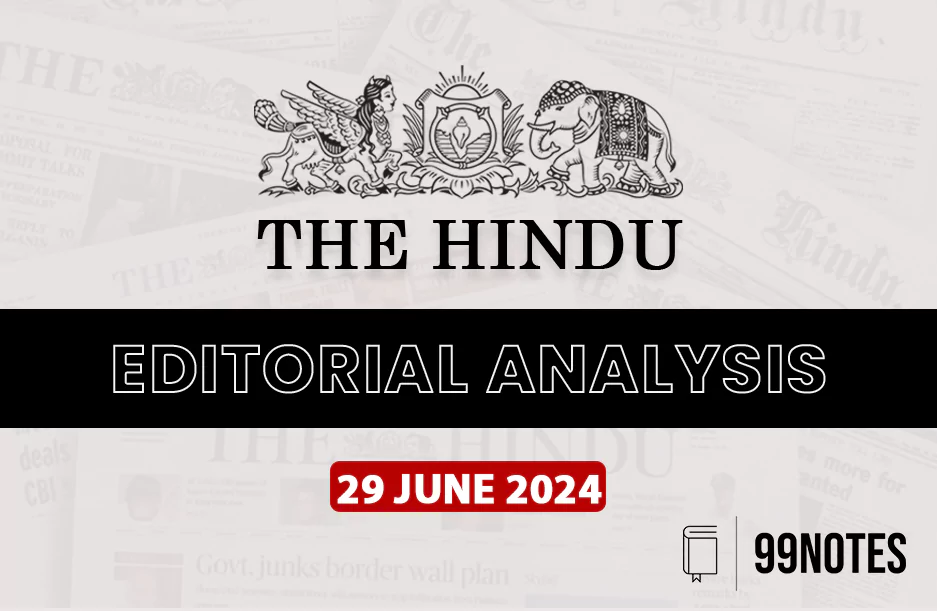29 June 2024 : The Hindu Editorial Analysis
1. The GST Council must not lose sight of broader reforms
(Source – The Hindu, International Edition – Page No. – 6)
| Topic: GS2 – Indian Polity, GS3 – Indian Economy – Issues relating to mobilisation of resources. |
| Context |
|
GST Council Meeting Overview
- The Goods and Services Tax (GST) Council convened last week for the first time in nearly nine months.
- The Council included 11 new State Ministers and a recalibrated National Democratic Alliance (NDA) government at the Centre.
- The agenda was loaded with clarifications, tweaks, forbearances, and procedural changes based on industry feedback and vetted by officials.
| The Goods and Services Tax (GST) Council: |
|
Meeting Outcomes and Decisions
- The Council acknowledged that it could not conclude deliberations on all accumulated items and resolved to meet again in August to address the remaining issues.
- Despite the backlog, the Council achieved consensus on several issues aimed at easing taxpayer burdens, reducing litigation, and providing tax relief.
Tax Relief and Exemptions
- Hostel accommodation costing up to ₹20,000 a month was exempted from GST.
- Railway services availed by passengers were also exempted.
- A uniform 12% GST rate was approved for packing cartons, milk cans, and solar cookers, eliminating confusing classification differences based on material or technologies.
Industry-Specific Measures
- Several industry-specific measures were approved, some with retrospective effect.
- The Council waived interest and penalty on tax dues for the first three years of GST, provided they are paid by March 2025.
- It lowered the stipulated pre-deposits for filing appeals, including those for the upcoming GST Appellate Tribunals.
- A new form was approved for taxpayers to correct errors or oversights in previous returns.
Key Reforms and Initiatives
- The Council decided to end the anti-profiteering clause, which required firms to pass on any tax cut gains to customers.
- Biometric-based Aadhaar authentication for all GST registrations was mandated in a phased manner across India.
- These measures aim to simplify the registration process and curb fraud through fake invoicing.
| Anti-Profiteering Clause: |
|
Future Plans and Rate Rationalisation
- The Council plans to take stock of the 2021 plan to rationalise the multiple-rate GST structure when it meets next.
- It is crucial for the apex GST body to revive and expedite GST rate reforms.
- The Council should also incorporate a road map to bring excluded items such as petroleum and electricity into the GST net while rejigging tax rates.
Conclusion
- The GST Council’s recent meeting marked a significant step towards simplifying and decluttering the seven-year-old indirect tax regime.
- The ground-level impact of these decisions will depend on the fine print that follows, but the intent to ease taxpayer burdens and streamline processes is clear.
- The upcoming August meeting and future efforts to rationalise the GST structure and include currently excluded items will be essential in achieving a more comprehensive and efficient GST system.
| PYQ: Enumerate the indirect taxes which have been subsumed in the Goods and Services Tax (GST) in India. Also, comment on the revenue implications of the GST introduced in India since July 2017. (150 words/10m) (UPSC CSE (M) GS-3 2019) |
| Practice Question: Discuss the recent measures taken by the GST Council to simplify the tax regime and their potential impact on taxpayers and the economy. (250 Words /15 marks) |



